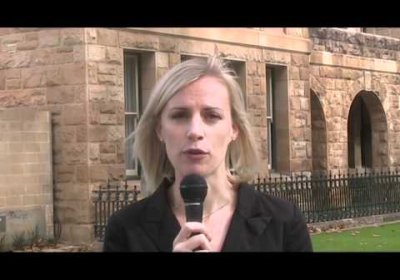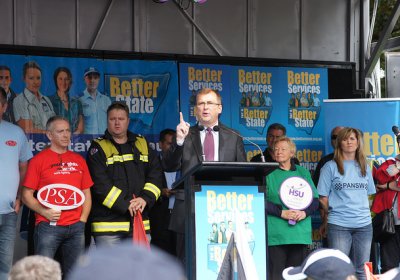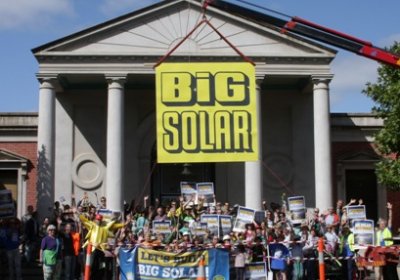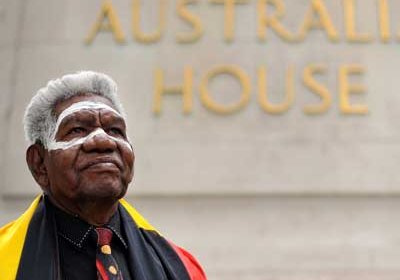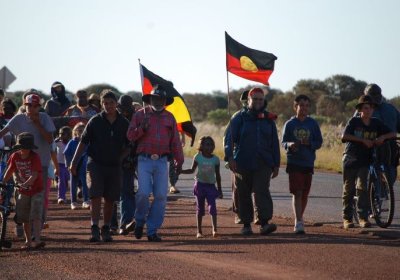On June 7, Australian Education Union (AEU) members — primary and secondary teachers in Victorian government schools — held their first stop-work meeting since 2008. About 25,000 teachers took part in Melbourne and marched to the steps of Victoria’s parliament house.
In 2008, teachers were campaigning for their Enterprise Bargaining Agreement (EBA), which expired at the end of last year. Since then the AEU officials have been unsuccessfully negotiating with Victoria’s Ted Baillieu state government for a new EBA.
Analysis
The 'scoop' behind two pro-Palestine activists facing court in Perth, Australia. Miranda Wood and Alex Bainbridge were charged with trespass for singing modified Christmas carols in December 2011.
The Stop the Intervention Collective Sydney released the statement below on June 1.
* * *
Richard Downs, spokesperson for the Eastern Alyawarr people in the Northern Territory, released the statement below on May 24.
* * *
We the Leaders and Custodians from Ampilatwatja Community Australia give our full support to Yolŋuw Makarr Dhuni (Yolŋu Nations Assembly).
The Refugee Action Coalition Sydney released the statement below on June 5.
* * *
The Four Corners’ people smuggling program [“Smuggler’s Paradise”] has only added to the demonisation that surrounds the media and politicians’ portrayal of people smugglers.
NSW unions are gearing up for “the biggest battle since Work Choices” to defend the rights of the state's sick and injured workers to receive just compensation.
The Barry O'Farrell government has outlined cuts to WorkCover that mean workers would no longer be covered on their way to and from work. Payments to injured workers would fall after 13 weeks (rather than 26 weeks). All medical costs and payments for workers who are still sick or injured after two-and-a-half years would be cut.
The government says that cutting benefits would “encourage” injured workers back to work.
What would Australia look like if Tony Abbott became the next prime minister?
The Liberal leader is an outspoken climate denier, a hardliner on locking out refugees, determined to crack down on union and workers’ rights and wants to extend racist and draconian attacks on Aboriginal rights.
Yet polls have consistently shown Abbott and the Coalition far ahead of the Julia Gillard Labor government, whose pro-business policies and internal scandals have made it deeply unpopular.
The rhetoric of homophobia is changing in our society. Those on the conservative side of the debate no longer make any mention of the Bible, morality or mental health. Instead, they claim they are motivated by love to oppress gay people.
Recently, I sat in the NSW legislative council (in which Reverend Fred Nile, MLC, is the honorary chaplain of the house) and watched the debate on marriage equality.
The radical ecologist Murray Bookchin once compared populationism to a phoenix, the mythical bird that periodically burns up and is reborn from its own ashes. No matter how often the “too many people” argument is refuted, it always returns, making the same claim that people are breeding too much and consuming too much, devouring the Earth like a plague of locusts.
The latest incarnation of the populationist phoenix is People and the Planet, a report published in April by the leading organisation of Britain’s scientific establishment, the 350-year-old Royal Society.
If Australia were a democracy and governments had no choice but to carry out the will of the majority, we’d be well on our way to a 100% renewable power grid.
Recent polling organised by climate action groups around the country found that 94% of 12,000 people polled said they wanted big solar power stations built in Australia. And 93% of those polled said the government should invest public money to make that happen.
Traditional owners across Arnhem Land will resist the federal government’s proposed 10-year extension of the Northern Territory intervention by refusing to surrender Aboriginal land through 40 year leases.
When the five-year leases imposed by the government’s declared "emergency" end in August this year, the most respected Aboriginal leaders across the Top End will not enter into any new land lease agreements until the draconian and discriminatory Stronger Futures legislation is shelved.
These are interesting times in the uranium sector. The mining companies have had a few wins in the 14 months since the Fukushima disaster, but they've had more losses.
Bill Repard, organiser of the Paydirt Uranium Conference held in Adelaide in February, put on a brave face with this claim: The sector's hiccups in the wake of Fukushima are now over with, the global development of new nuclear power stations continues unabated, and the Australian sector has literally commenced a U-turn in every sense.
- Previous page
- Page 396
- Next page

